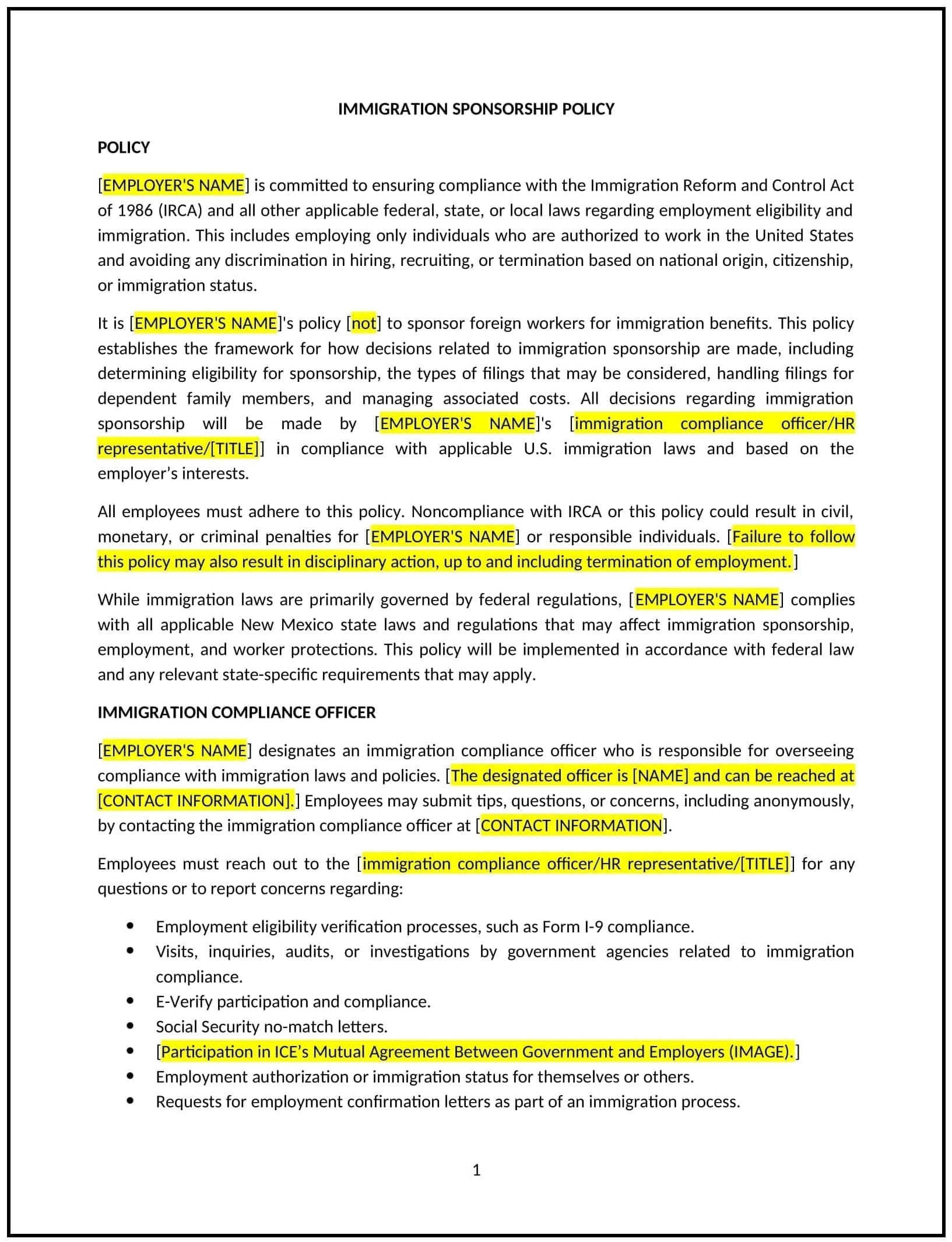Immigration sponsorship policy (New Mexico): Free template
Got contracts to review? While you're here for policies, let Cobrief make contract review effortless—start your free review now.

Customize this template for free
Immigration sponsorship policy (New Mexico)
This immigration sponsorship policy is designed to help New Mexico businesses navigate the process of sponsoring foreign nationals for work visas and permanent residency. The policy outlines the company's approach to immigration sponsorship, including the eligibility criteria, the types of sponsorship available, and the procedures for sponsoring employees.
By adopting this policy, New Mexico businesses can ensure a fair, transparent, and consistent approach to immigration sponsorship, allowing them to attract and retain skilled talent from around the world while supporting compliance with applicable laws and regulations.
How to use this immigration sponsorship policy (New Mexico)
- Define eligibility: Clearly specify which employees are eligible for sponsorship, such as those in specialized roles, those with skills in high-demand industries, or those with work experience that benefits the company.
- Specify sponsorship types: Outline the different types of immigration sponsorship that the company is willing to support, such as H-1B visa sponsorship, green card sponsorship, or other work visa categories.
- Establish the process for requesting sponsorship: Describe the process employees must follow to request sponsorship, including the documentation needed, the steps to initiate the application, and the timeline for processing requests.
- Address responsibilities and costs: Clarify the company's responsibilities during the sponsorship process, including paying application fees or legal costs, and explain whether the employee will share any costs.
- Reflect New Mexico-specific considerations: Include any state-specific considerations, such as particular state tax or employment laws that could impact the sponsorship process. Ensure the policy aligns with both federal and New Mexico state regulations.
Benefits of using this immigration sponsorship policy (New Mexico)
Implementing this policy provides New Mexico businesses with several advantages:
- Attracts skilled talent: Sponsoring foreign nationals helps businesses access a broader pool of skilled workers, particularly in industries with talent shortages or specific expertise.
- Increases diversity: Sponsorship promotes workforce diversity, which can lead to increased innovation, diverse perspectives, and improved company culture.
- Enhances competitiveness: By offering sponsorship opportunities, businesses can attract top talent from around the world, giving them a competitive edge in hiring.
- Reduces turnover: Sponsorship provides employees with the stability of long-term employment, which can increase job satisfaction and reduce turnover rates.
- Supports legal compliance: The policy helps businesses stay compliant with U.S. immigration laws and ensures that the sponsorship process is carried out legally and transparently.
Tips for using this immigration sponsorship policy (New Mexico)
- Communicate the policy clearly: Ensure that all employees are aware of the immigration sponsorship policy and the eligibility criteria for sponsorship. Make the policy available through the employee handbook or company intranet.
- Review sponsorship requests regularly: Set up a system to regularly review requests for sponsorship and ensure that decisions are made based on the company’s needs, the employee’s qualifications, and legal requirements.
- Consult legal experts: Work with immigration attorneys to ensure that all sponsorship applications are handled properly, including the correct filing of documents, timely submission of forms, and adherence to federal and state immigration laws.
- Set expectations for employees: Clearly explain the process and timeline for sponsorship, and ensure that employees understand their responsibilities, such as providing necessary documentation and maintaining eligibility for their visa status.
- Monitor changes in immigration laws: Regularly review changes in U.S. immigration laws and New Mexico state regulations that may affect the sponsorship process, and update the policy as needed.